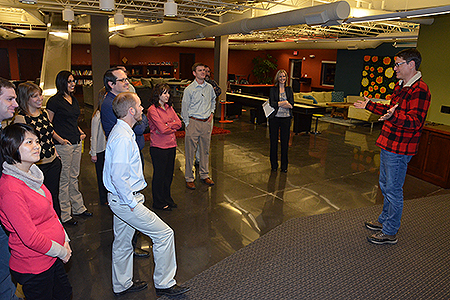If you consider yourself a talented and productive worker with value to your employer, Dr. Jenna Pieper, assistant professor of management at the University of Nebraska–Lincoln College of Business Administration, has good news for you. You will likely be rewarded for your efforts at companies that offer pay-for-performance incentives and your employer could be rewarded too.
Pieper and her colleagues recently published their findings in the
Journal of Management after spending four years researching the topic of pay-for-performance. Pieper explained there has been controversy regarding whether or not pay-for-performance can predict future employee performance.
“There had not been much longitudinal data where you have four years to study data across a long period of time” Pieper said. “Our paper is unique because we looked at employees in different geographical locations and different work units – sales, call centers and executives. What we found is both merit pay and bonus pay lead to future higher performance.”
The study also discovered it is not simply about economic incentive but also the manner in which the money is paid. Though both merit pay and bonus pay are predictors of higher performance, bonus pay is more effective.
“If you look at it from an economic perspective, it doesn’t make sense because merit pay will increase your base salary more over time. It also effects your retirement which often includes an employer match, so that’s going to really accumulate. What we found was the instant gratification of getting a lump sum of money as a bonus is more effective in predicting future performance even though the employee would be better off economically with merit increases,” Pieper said.

Pieper teaches students human resource skills by touring local business Firespring
Pieper began the research paper as a Ph.D. student at the University of Wisconsin-Madison. Ironically, the topic of pay-for-performance which she now specializes in did not interest her then.
“One of my colleagues was doing research on the topic and asked me to conduct an in-depth literature review of pay-for-performance. I read every possible paper, summarized them and dove deep into the research. I started connecting the ideas and that’s what got my interest. Now I teach the compensation class to undergraduates here at CBA.”
She also teaches an MBA course in strategic human resource management and shares her passion for the subject by involving students in team projects where they create their own compensation packages. Students also visit local businesses to see first-hand how a positive and consistent human resource policy can create success for both employees and firms.
Pieper is glad to be doing the work she loves back in her home state having grown up in Harvard, Neb. She moved to Lincoln in 2012 after teaching one year at the University of Texas at Dallas.
“I feel very blessed to be here. We are closer to my family and my husband’s family now, and it’s a great place for raising our three children.”
Her research paper “Pay-for-Performance’s Effect on Future Employee Performance: Integrating Psychological and Economic Principles Toward a Contingency Perspective,” is forthcoming in the
Journal of Management and was co-authored with Dr. Anthony Nyberg of the University of South Carolina and Dr. Charlie Trevor of the University of Wisconsin-Madison.
Published: February 11, 2014